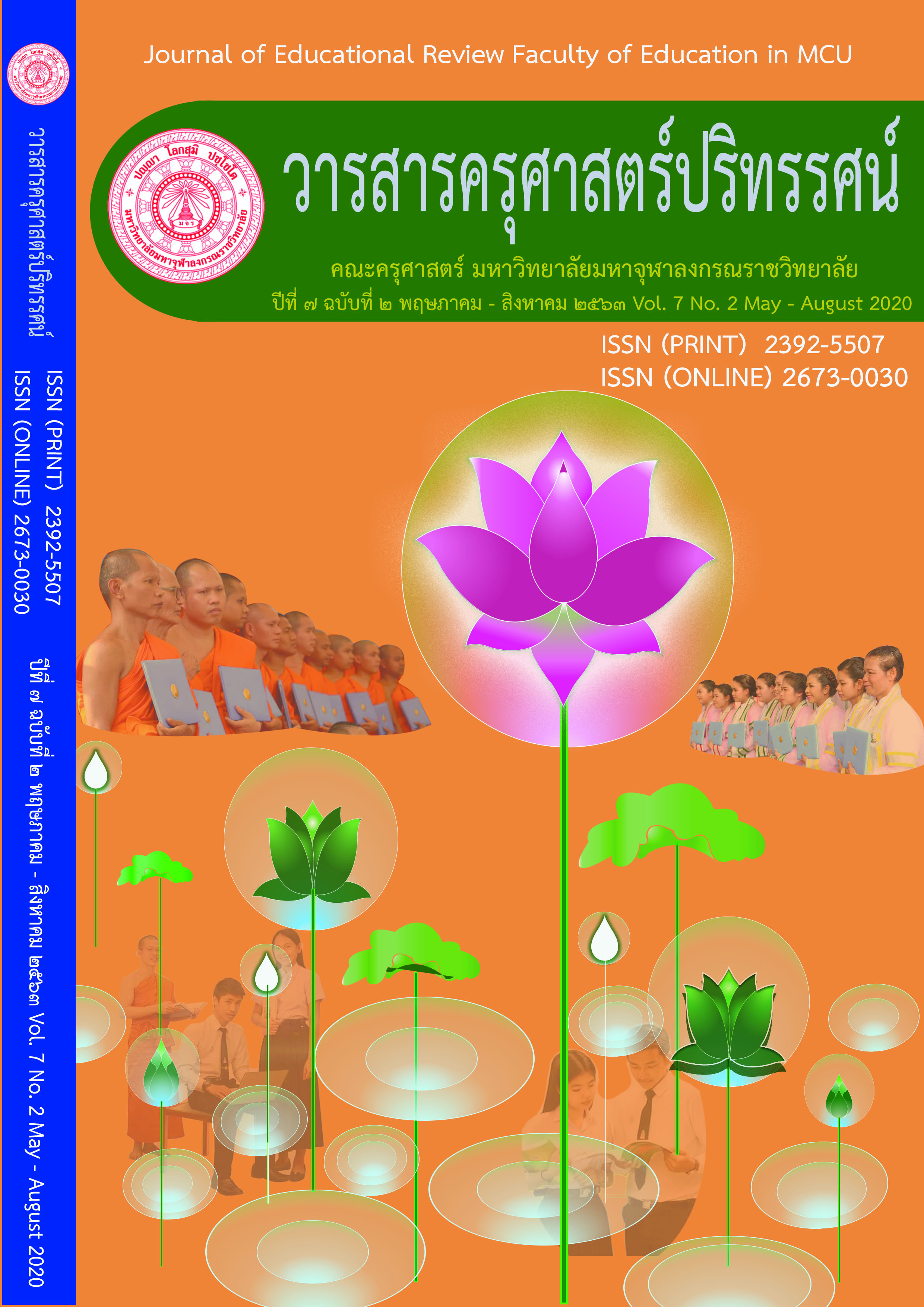A STUDY OF THE RESULTS LEARNING MANAGEMENT BY USING RESEARCH-BASED LEARNING IN SCIENCE AND LOCAL WISDOM ON THE ANALYTICAL THINKING ABILITY OF SCIENCE STUDENTS
Main Article Content
Abstract
The purpose of this research paper were 1) to compare the analytical thinking ability of students before and after learning by used the Research-based learning and 2) to study the level of analytical thinking ability in each element of students after learning by used the Research-based learning. The studied samples were 28 undergraduates in the course of Science and Local Wisdom in the second semester of the academic year 2018, Faculty of Education, Phranakhon Si Ayutthaya Rajabhat University. There were 2 kinds of research instrument: 1) The instrument used in the experiment was a learning plan in Science and Local Wisdom. and 2) The data collecting instrument of used for data collection was the analytical thinking ability test that was a two tier diagnostic concept test 2-4-choice and students reasoned in choosing the choices. The finding research found that 1) Students had an average score of ability Analytical thinking in courses science and local wisdom after learning was higher than before learning, which had statistically significant differences at the 0.05 level. 2) Students had the ability to think and analyze the average components. Highest when the level of analytical thinking ability is at a very good level, followed by analytical thinking The relationship when the level of analytical thinking ability is at a good level and the analytical thinking principles when the level of analytical thinking ability is at a good level because these 3 types of analytical thinking are Complex, different and affecting activities that give students the ability to think critically.
Article Details
ทัศนะและความคิดเห็นที่ปรากฏในบทความในวารสารฉบับนี้ถือเป็นความรับผิดชอบของผู้เขียนบทความนั้นเพียงผู้เดียว และไม่ถือเป็นทัศนะและความรับผิดชอบของกองบรรณาธิการ
กองบรรณาธิการขอสงวนสิทธิ์ในการคัดเลือกบทความลงตีพิมพ์และจะแจ้งให้เจ้าของบทความทราบหลังจากผู้ประเมินบทความตรวจอ่านบทความแล้ว
ต้นฉบับที่ได้รับการตีพิมพ์ในวารสารครุศาสตร์ปริทรรศน์ คณะครุศาสตร์ มหาวิทยาลัยมหาจุฬาลงกรณราชวิทยาลัย ถือเป็นกรรมสิทธิ์ของคณะครุศาสตร์ มหาวิทยาลัยมหาจุฬาลงกรณราชวิทยาลัย ห้ามนำข้อความทั้งหมดหรือบางส่วนไปพิมพ์ซ้ำ เว้นเสียแต่ว่าจะได้รับอนุญาตจากมหาวิทยาลัยฯ เป็นลายลักษณ์อักษร
References
กองวิจัยทางการศึกษา กรมวิชาการ . (2542). การสังเคราะห์งานวิจัยเกี่ยวกับการเรียนการสอนวิทยาศาสตร์ระดับประถมศึกษา. กรุงเทพมหานคร: กระทรวงศึกษาธิการ.
ชัยวัฒน์ สุทธิรัตน์. (2553). การจัดการเรียนรู้แนวใหม่. นนทบุรี: สหมิตรพริ้นติ้งแอนด์พับลิสซิ่ง.
ชุติมา วัฒนะคีรี. (2561). ความสามารถในการคิดวิเคราะห์ของนิสิตระดับปริญญาตรี มหาวิทยาลัยราชพฤกษ์. วารสารมนุษยศาสตรและสังคมศาสตร์ มหาวิทยาลัยราชพฤกษ์. 4(1). 101 – 110.
พวงผกา ปวีณบำเพ็ญ. (2560). การจัดการเรียนรู้โดยใช้วิจัยเป็นฐาน (Research-Based Learning). CMU Journal of Education. 1(2). 62-71.
พิมพ์ปวีณ์ สุวรรณโณ และศุภลักษณ์ สินธนา. (2561) การศึกษาผลสัมฤทธิ์ทางการเรียนและทักษะการวิจัยของนักศึกษาชั้นปีที่ 4 มหาวิทยาลัยราชภัฏยะลาที่เรียนด้วยการจัดการเรียนการสอนโดยใช้การวิจัยเป็นฐาน. วารสารมหาวิทยาลัยราชภัฏยะลา. 13(1). 161-170.
ไพฑูรย์ สินลารัตน์. (2557). หลักและเทคนิคการสอนระดับอุดมศึกษา. พิมพ์ครั้งที่ 4. กรุงเทพมหานคร: วี.พริ้น (1991).
สมหวัง พิธิยานุวัฒน์ และทัศนีย์ บุญเติม. (2540). การสอนแบบ Research-Based Learning ในแบบแผนและเครื่องมือ วิจัยทางการศึกษา. กรุงเทพมหานคร: โรงพิมพ์จุฬาลงกรณ์มหาวิทยาลัย.
สำนักงานคณะกรรมการการศึกษาขั้นพื้นฐาน. (2553). พระราชบัญญัติการศึกษาแห่งชาติ เพิ่มเติม (ฉบับที่ 3). กรุงเทพมหานคร: สำนักนายกรัฐมนตรี.
สุทธิวรรณ พรีศักดิ์โสภณ สุรชัย มีชาญ และสมกิจ กิจพูนวงศ์. (2552). การศึกษาคุณภาพของแบบทดสอบ SWUSAT ที่ใช้ในการคัดเลือกบุคคลเข้าศึกษาต่อในมหาวิทยาลัยศรีนครินทรวิโรฒ วิเคราะห์โดยใช้ทฤษฎีการทดสอบแบบมาตรฐานเดิมและทฤษฎีการตอบข้อสอบ. รายงานวิจัย. สำนักทดสอบทางการศึกษาและจิตวิทยา: มหาวิทยาลัยศรีนครินทรวิโรฒ.
สุวิทย์ มูลคำ และอรทัย มูลคำ. (2546). 19 วิธีจัดการเรียนรู้: เพื่อพัฒนาความรู้และทักษะ. กรุงเทพมหานคร: ภาพพิมพ์.
Çalik, M. Ayas, A and Coll, C.K. (2009). Investigating the effectiveness of an anlogy activityin improving students. conceptual solution chemistry concepts.
Marzano, Robert J. (2001). Designing a New Taxonomy of Educational Objective. Thousand Oaks. California: Corwin Press, Inc.


